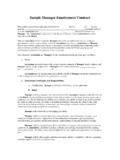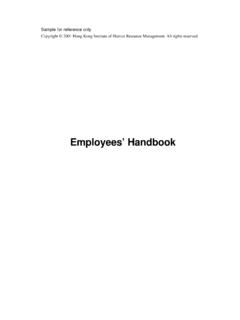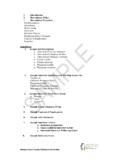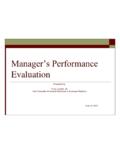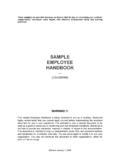Transcription of NDA Employment Contract - Namibia Dent
1 Employment Contract (PROBATIONARY APPOINTMENT) by and between 1. DR TONY SAMPLE (hereinafter referred to as "the Employer".) and .. (hereinafter referred to as "the Employee".) (hereinafter jointly referred to as "the Parties") 2. IDENTIFICATION NUMBER: .. 3. POSITION AND DUTIES The Employee is employed as: Receptionist and Chair side Assistant A brief job description pertaining to the position is attached hereto as Annex A. It forms part of this Employment Contract and indicates the key performance areas for which the Employee assumes responsibility. The Employer reserves the right to amend the job description from time to time as circumstances may require in consultation with the Employee. 4. PLACE OF Employment The Employee will be employed in.
2 (city/town) and must report to the manager at .. (place/workstation). 5. REMUNERATION The basic salary will amount to N$ .. which will be paid monthly in arrears. Other benefits include: .. Remuneration, less required deductions will be paid by direct deposit into an account to be designated by the Employee for this purpose. 2 Salaries are normally reviewed annually based on work-performance, economic trends in the industry and the Employer s financial standing. 6. DATE OF APPOINTMENT AND PROBATION The Employee s date of appointment will be the date of assumption of duty which shall occur after the Parties have duly signed this Employment Contract and initialed each page. The initial three months Employment will be deemed a probationary period during which the Employee s suitability for the position will be monitored and feedback be provided.
3 The probationary Employment may be terminated at any stage during that period in accordance with legal requirements, it may also be extended by mutual agreement if considered appropriate. After the successful completion of the probationary period the appointment will convert into permanent Employment to be confirmed by the Employer in writing. Employment will thereafter continue until the Employment Contract between the Employer and the Employee is lawfully terminated for any reason as provided for in Clause 17. Compulsory retirement will also terminate the Contract when the Employee reaches the age of 60. 7. HOURS OF WORK Ordinary working hours will be maximum of 45 hours per week from 07h30 to 16h30 Monday to Friday with one hour lunch break.
4 The employer may, in his discretion, permit the employee to take some Wednesday afternoons off. It is expressly recorded that when the employee has to work on a Wednesday afternoon, that this forms part of normal working hours and that no additional remuneration will be payable in respect thereof. 8. OVERTIME AND WORK ON SUNDAYS AND PUBLIC HOLIDAYS The Employee agrees to work additional hours whenever requested by the Employer due to operational requirements during the week, over weekends and/or public holidays, subject to reasonable prior notice having been given. It is also agreed that in the event of urgent work it will be compulsory for the Employee to do overtime without any notice if necessary.
5 Payment for additional time worked will be as provided for by the Labour Act, 2007. No such claims shall be considered unless the additional work was authorised in writing beforehand. The Employee will not be expected to work more than three hours overtime on any day or more than a maximum of ten hours a week, except for urgent work or stocktaking. 3 9. ATTENDANCE The Employee will be required to register his/her attendance at work by means of a register, clock card system or similar device in accordance with approved procedures. 10. LEAVE/ABSENCE FROM WORK The Employee s entitlement to leave will be in accordance with the provisions of the Labour Act, 2007, where applicable. Annual leave shall be 20 working days for every completed cycle of 12 months Employment .
6 The Employer normally closes for the Festive Season during which time employees take annual leave. Sick leave shall be 30 working days per 3 year cycle of Employment . Should the Employee be unable to attend work for any reason without having obtained prior leave of absence, it is important that Management be notified before 07h30 in the morning the same day of the reason for the non-attendance and the envisaged length thereof. 11. RULES, PROCEDURES AND POLICIES The Employee will be subject to all rules, procedures and policies formulated by the Employer and any amendments thereto affected by the Employer at his discretion from time to time. The Employee will be expected to familiarise him/herself with the content of these rules, procedures and policies and any amendments thereto.
7 12. DISCIPLINARY CODE A copy of the Employer s Disciplinary Code is attached as Annex B. and constitutes part of the Employment Contract . 13. TRAINING AND DEVELOPMENT The Employee agrees to diligently undergo any additional job-related training and development as may be decided upon by the Employer at its discretion. 14. SECURITY Effective security is of the utmost importance to the Employer's practice. In this regard the Employee will, therefore, be required to: Comply with any security measures and procedures instituted by the Employer and familiarise him/herself with such measures and procedures. Report any contravention of security measures and procedures or suspected acts of dishonesty/theft to the Employer 4 15. RESPONSIBILITIES AS EMPLOYEE The Employee: Shall faithfully obey all lawful and reasonable instructions from supervisors placed in authority over him/her; may be required to perform duties at other places and in such other capacity he/she is competent to perform; must devote all his/her time during working hours to the business of the Employer and shall do all in his/her power to promote, develop and extend the business of the Employer; may not be absent from work without having obtained prior written permission for leave, except in an emergency or in circumstances beyond his/her control.
8 May not during working hours, without authority leave his/her duties to attend to private activities, receive private visitors or otherwise allow his/her attention to be engaged with private matters; may not without written authority take on any other remunerated activity outside his/her Employment with the Employer, nor, during working hours or after hours, engage in any other business activities for private gain; may not be under the influence of intoxicating liquor or a narcotic drug whilst on duty, nor smoke in any restricted area; may not convert to own use any Employer property and/or goods and may also not remove any such property and/or goods from the Employer premises other than in performing his/her official duties unless he/she has first obtained written permission from Management; may not publicly comment on the management or working of the Employer, or do anything likely to damage its business or standing in any manner; may not disclose any information concerning the affairs or the business of the Employer or of its personnel or show any official document to persons not employed with the Employer, unless he/she is required to do so in the course of his/her duties.
9 May not use for any purpose other than for the discharge of his/her official duties, information gained by or conveyed to him/her through his/her connection with the Employer, nor divulge any trade secrets of the Employer; shall not in any way pledge the credit of the Employer, or expose the Employer to any liability except in so far as he/she may be authorised by the Employer; shall limit private telephone calls whilst on duty to urgent matters only; and shall observe the Employer s health and safety rules and take all reasonable 5 care to look after his/her own personal health and safety at the workplace as well as the health and safety of colleagues and any other persons on the premises. A breach of any of these rules constitutes serious misconduct and shall render the Employee liable to disciplinary action.
10 16. FAIR Employment RELATIONS Both Parties commit themselves to establish and maintain sound labour practices to ensure uninterrupted work performance of a standard, which will create and maintain a highly competitive image for the Employer and its services. The Employer undertakes to promote the highest possible degree of cooperative relations between employees at all levels. 17. TERMINATION OF Employment This Employment Contract may be terminated on the following grounds: Upon reaching retirement age by the Employee. By mutual agreement between the Parities Death of the Employee. Subject to the provisions of the Labour Act, 2007, by either party giving the other party not less than thirty (30) days notice. By the Employer, on grounds of misconduct, incapability or incapacity on the part of the Employee, or for reasons of redundancy.

